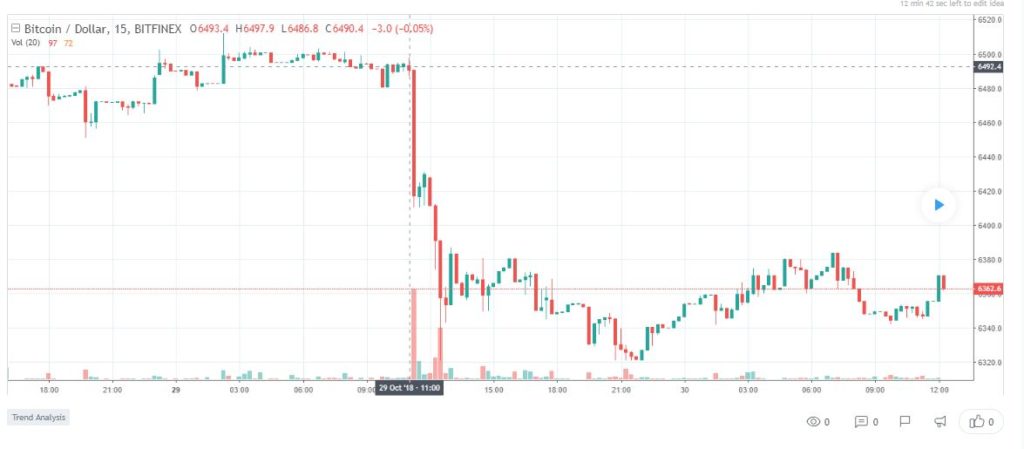[ad_1]
On October 29th around 11:00 am GMT, the price of Bitcoin (BTC) suddenly plunged from comfortable levels of around $6,493 to $6,320 in a time span of 12 hours. Many crypto traders had assumed the streak of Bitcoin stability would continue until Bakkt started its operations later this December. The launch of Bakkt would have stimulated the recovery of not only BTC, but the entire crypto market.
The King of Crypto had also shown its resilience for over a month and as Bitcoin futures contracts by the CME Group expired on the 26th of October. What is usually the norm when Wall Street traded Bitcoin Futures Contracts expire, is that Bitcoin drops a few percentage points in value. However, BTC seemed immune this October.

Regulatory Fears in the UK
It is with the recent unexpected drop in the value of Bitcoin that many crypto enthusiasts were curious as to what might have caused the disruption in BTC’s stability.
The initial news of regulatory fears in the UK was broken by The Telegraph. The online publication had this to say with regards to crypto regulation in the United Kingdom:
A plan by MPs to make the Financial Conduct Authority crack down on illegal activity in the crypto industry is “ashamedly geared around Bitcoin” and could penalise any other kind of asset…
[It] prompts for the Government to extend the power of the FCA’s “Regulated Activities Order”, which governs the UK financial market.
The Block has since published the entire report published by the aforementioned Cryptoasset Taskforce, the Financial Conduct Authority (FCA). The FCA has made it clear that in its view, crypto assets have no intrinsic value and according to them, investors should therefore be prepared to lose all the value they have put in.
The FCA has committed to the following actions and consultations in:
- Perimeter guidance by the end of 2018 to clarify which cryptoassets fall within the existing regulatory perimeter, and those cryptoassets that may fall outside
- Whether the regulatory perimeter requires extension to capture cryptoassets that have comparable features to specified investments, but currently fall outside the perimeter
- A separate consultation by Q1 2019 on a potential prohibition of the sale to retail consumers of derivatives (including contracts for differences, options, and futures) referencing certain types of cryptoassets
- Given the complexity and new challenges presented to traditional forms of financial regulation, more time is needed to consider how regulation can meaningfully address the risks posed by exchange tokens, such as Bitcoin. The government will issue a consultation in early 2019 to further explore whether and how exchange tokens, and related firms such as exchanges and wallet providers, could be regulated effectively
- Implementing one of the most comprehensive responses globally to the use of cryptoassets for illicit activities by applying and going further than the fifth EU Anti-Money Laundering Directive
The FCA is also committed to monitoring the crypto markets in collaboration with international counterparts as they attempt to define and regulate the industry.
In summary, news of the UK’s FCA planning regulatory measures might be why the value of Bitcoin suddenly fell on the 29th of October. Earlier this year, similar plans by the South Korean, Japanese and Chinese governments caused the value of our favorite digital assets, to fall from their peak values in January. The crypto market is yet to recover from the aftershocks of regulation in South Korea, Japan and China.
What are your thoughts on the possible crypto regulations in the UK? Please let us know in the comment section below.
[ad_2]
Source link
